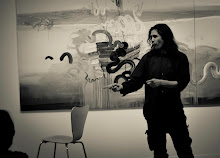One of the things I love about philosophy is its endless ability to ask you to see the world from another perspective. Take my latest performance piece on George Berkeley. Now the piece itself is a lovely little essay from the minor history of thought. It has a certain place in the philosophical canon, and presents an interesting proof for the existence of God, while making a nice point about the nature of being, and the problem of abstract thought, but on the face of it, that is all.
And yet there must be something so much more to this piece - for it really spoke to the audience in a way that other philosophers perhaps sometimes do not. The reaction to a minor philosopher is itself very interesting (and gratifying), but with with my very strict philosopher's hat on, rather surprising. However, seen from another perspective there is no mystery in it. I think people are reacting warmly to two central (and inter-related) claims in Berkeley's argument. Firstly there is his claim that to accept the radical truth of perception, and the world as we see it, is actually rather a difficult thing to do. We are forever drawn away from that bright perception, and led into other thoughts, or abstract speculations, and miss its power, or simply assume that we know what it is. More than that, one misses where the real world actually is - where it exists - in a me. But secondly, on very deep level, if the being of the world is tied to my perceiving of it, then its order (as well as those thoughts not derived from perception, namely awareness of others), imply a deep order beyond simple actuality. To give and be given in the world, at the same moment, and in the same thought, opens up that giving, that perceiving, to morality (or we might say ethics). So that what I perceive, what I choose to look at, and the thoughts I derive from that choice, those experiments, are necessarily already ethical in what they encompass. The bright being of perceptions (which is their reality) might predate all our thoughts about them, and so we need to think inside them (that is inside evidence itself), and yet that 'inside' is enmeshed within a moral order, which puts the reality of the perceptions within a wider framework where truth and the way we share knowledge with each other, is itself already part of a wider picture.
In short Berkeley puts his finger, in an incredibly perceptive way, on one of the central problems of modernity. Once one understands perceptions, not as simple reflections of God given essences (a world where hats and dogs simply are), but rather as part of evidence, that might open out on many worlds (dogs exist, but so too do electrons, quarks, and fundamental strings), then we are necessarily caught up in endless ethical problems of what we should look at and why. The seemingly 'neutral' act of the scientist, who is determined at one level to let the world be and does so free from any assumptions, might be neutral in itself, but on another level it is an act beset by moral questions and ethical implications.
Berkeley understands even before the 'scientific age' properly gets going, both the importance of letting perceptions be in our minds, but also the ethical implications about where such experiments might lead. What is more he understands this in way that encourages thought in itself, and wants us to answer him, and do so in a constructive and generous manner of our own. He gives us much to think about and with, even if we do not agree with him. And it is this generosity, which spoke to Hume, Kant, Hegel and Wittgenstein so powerfully, that still has its great power to move us all. In short Berkeley is wonderful because he opens us all to being, if but for a while, great philosophers, and to think for ourselves.


No comments:
Post a Comment